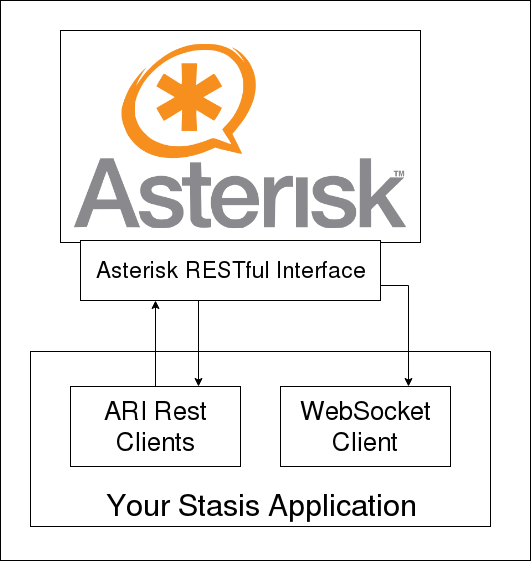opiy-org / asterisk-ari-php
Asterisk REST Interface (ARI) 的面向对象客户端。为您处理 ARI 通话和事件。
Requires
- php: ^8.0|^8.1
- ext-json: *
- cuyz/valinor: dev-master
- guzzlehttp/guzzle: ^7.0
- monolog/monolog: ~1.0||~2.0
- ratchet/pawl: ~0.3
Requires (Dev)
- dg/bypass-finals: ^1.4
- phpmd/phpmd: ^2.13
- phpstan/phpstan: ^1.9
- phpunit/php-code-coverage: ^9.2
- phpunit/phpunit: ^9.5
- roave/security-advisories: dev-master
- squizlabs/php_codesniffer: ~3.5
README
从以下链接 fork:https://bitbucket.org/ngvoice/asterisk-ari-client/
Asterisk REST Interface 的客户端实现和简单的 Stasis 应用程序开发库。
目标是使 ARI 通话安全且易于使用。因此,我们希望在应用程序代码中消除 JSON 解析。相反,我们希望尽可能简化任何人与 ARI 通信的过程,而无需担心客户端存根的实现。
先决条件
从以下链接下载并安装 composer:
https://getcomposer.org.cn/download/
安装
Composer
请运行以下命令将库添加到您的项目中
PHP 7.4 composer require opiy-org/asterisk-ari-php
PHP 8.0|8.1 composer require opiy-org/asterisk-ari-php:2
在安装过程中,您可能会遇到有关缺少 PHP 扩展的 composer 错误。根据您的操作系统,有多种安装方法。在极少数情况下,您可能需要先安装 php-dev,然后通过 PECL 安装和启用扩展。但这通常不是必需的。
Asterisk
您将需要启动一个 Asterisk 实例并对其进行配置,才能使用 ARI。官方 Asterisk 文档将指导您如何操作。
https://wiki.asterisk.org/wiki/display/AST/Asterisk+Configuration+for+ARI
或者,使用我们的 Dockerfile 启动 Asterisk(请参阅部署部分)。
示例
REST 客户端
通过提供的 REST 客户端与 Asterisk REST Interface 进行通信。所有请求和响应都是对象,易于理解。
以下示例使用 Channels 资源发起一个通话
<?php
declare(strict_types=1);
use OpiyOrg\AriClient\Exception\AsteriskRestInterfaceException;
use OpiyOrg\AriClient\Client\Rest\Settings as AriRestClientSettings;
use OpiyOrg\AriClient\Client\Rest\Resource\Channels as AriChannelsRestResourceClient;
require_once __DIR__ . '/vendor/autoload.php';
// Of course inject your own REST client settings here.
$ariChannelsRestResourceClient = new AriChannelsRestResourceClient(
new AriRestClientSettings('login', 'password', '127.0.0.1', 8088, 'ari-php')
);
try {
// Call the specified number
$originatedChannel = $ariChannelsRestResourceClient->originate(
'PJSIP/+4940123456789',
[
'app' => 'MyExampleStasisApp'
]
);
} catch (AsteriskRestInterfaceException $e) {
printf("Error occurred: '%s'\n", $e->getMessage());
}
printf("The originated channel has the ID '%s'\n", $originatedChannel->getId());
WebSocket 客户端
连接到 Asterisk 并订阅 Stasis 应用程序。以下示例展示了如何定义您的 Stasis 应用程序以及如何处理特定传入的事件,这些事件由应用程序上下文中的通道发出。
在这个示例中,我们处理了一个 StasisStart 事件
<?php
declare(strict_types=1);
// TODO: Change to your own project namespace.
namespace My\Own\Project\Namespace;
use OpiyOrg\AriClient\StasisApplicationInterface;
use OpiyOrg\AriClient\Model\Message\Event\StasisStart;
/**
* Write your own Stasis application class that must implement the
* StasisApplicationInterface.
*
* This application will register automatically in Asterisk as soon
* as you start a WebSocketClient (@see example/my_example_stasis_app_worker.php).
*/
class MyExampleStasisApp implements StasisApplicationInterface
{
/**
* To declare an ARI event handler function, name it after
* the occurring Asterisk event you want to handle and add
* the prefix 'onAriEvent'. The only parameter is the object
* representation of the event, provided by this library.
* The function MUST also be public and non-static.
*
* Of course you can define any other functions within this class
* that do not handle incoming ARI events (leave out the prefix ;-)).
* Think of your Stasis application class as container for your
* application logic.
*
* The StasisStart event for example is triggered for
* channels when they enter your application.
*
* @param StasisStart $stasisStart The Asterisk event,
* telling you that a channel has entered your application.
*/
public function onAriEventStasisStart(StasisStart $stasisStart): void
{
printf(
'This is the channel's StasisStart event '
. "handler triggered by channel '%s' :-)\n",
$stasisStart->getChannel()->getId()
);
}
}
编写 PHP 脚本来启动您的 WebSocketClient 工作进程。这是一个阻塞过程!对于生产环境,您应该在后台使用进程管理器运行它。我们推荐 Linux 的 supervisor。
<?php
declare(strict_types=1);
use OpiyOrg\AriClient\Client\WebSocket\Factory as AriWebSocketClientFactory;
use OpiyOrg\AriClient\Client\WebSocket\Settings as AriWebSocketClientSettings;
require_once __DIR__ . '/vendor/autoload.php';
require_once __DIR__ . '/MyExampleStasisApp.php';
/*
* Initialize an ARI web socket client to
* listen for incoming Asterisk events.
*
* Of course inject your own web socket settings here.
*/
$ariWebSocketClient = AriWebSocketClientFactory::create(
new AriWebSocketClientSettings('asterisk', 'asterisk'),
new MyExampleStasisApp()
);
$ariWebSocketClient->start();
您可以在 example 目录中找到更详细且包含更多选项的示例。
调试日志
为了调试您的 ARI 通信,此客户端库提供简单的调试日志开关。只需在 REST/web socket 客户端设置对象中启用/禁用它即可。错误日志将写入 STDERR。所有其他日志将写入 STDOUT。
或者,使用您自己的 Logger 并将其传递给 REST 客户端和/或 WebSocket 客户端构造函数。
错误处理器
如 example/my_example_stasis_app_worker.php 中所述,您可以为您的应用程序添加自定义错误处理器。这是 Stasis 应用程序逻辑(例如,example/MyExampleStasisApp)与 PHP 进程错误处理器之间的一层。这意味着您可以选择处理未在应用程序逻辑中捕获的 Throwable,它通常会导致应用程序(以及可能整个进程)崩溃。为什么不将其报告给 BugSnag 呢?
运行测试
单元测试
composer test
编码风格测试
用于代码审查
composer lint
用于静态代码分析
composer sca
部署
我们在 docker/asterisk/ 目录中添加了一个Dockerfile,您还可以在这里找到一些用于您自己的Asterisk实例的示例配置文件。
建议使用本库中提供的Dockerfile来编译您自己的Asterisk容器。
cd docker/asterisk
docker build -t --build-arg asterisk_version=WHATEVER_VERSION_YOU_LIKE asterisk:latest .
docker run -d --name some-asterisk -p 8088:8088 -p 5060:5060 -p 5060:5060/udp asterisk:latest
!!! PLEASE NOTE !!!
Compiling Asterisk sometimes is bound to the hardware you are compiling it on.
Currently, we compile a separate container for every machine we run Asterisk on,
to make sure it will work.
Alternatively, you can set generic compiler flags at your own risk.
许可证
MIT
原始来源:ngvoice/asterisk-ari-client(由ng-voice提供)
贡献者
欢迎您的pull请求。如果您想贡献,请坚持PSR-12编码标准。

